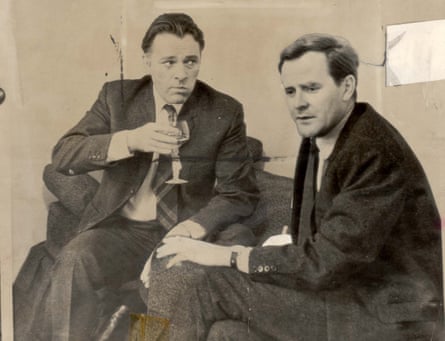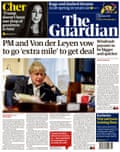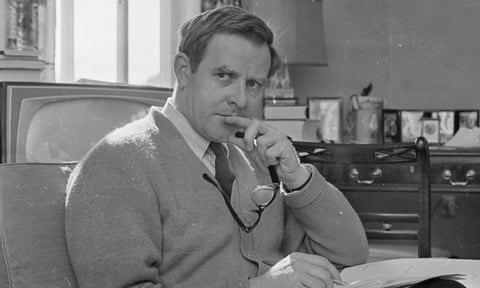Top story: ‘A literary giant’
Good morning and welcome to this Monday briefing, with me, Alison Rourke.
Tributes have poured in for John le Carré, a giant of cold war thrillers and the author of one of Britain’s best-known fictional spies, who has died of pneumonia, aged 89. Author Stephen King wrote: “This terrible year has claimed a literary giant and a humanitarian spirit.” Historian Simon Sebag Montefiore called him “the titan of English literature up there with the greats”. The Le Carré (real name David Cornwell) novels came to symbolise the cold war, including Tinker Tailor Soldier Spy and The Spy Who Came in from the Cold. Having first interacted with the security services while at Oxford Univesity, Le Carré began working for them while studying German in Switzerland at the end of the 1940s. After teaching at Eton, he joined the British Foreign Service as an intelligence officer, recruiting, running and looking after spies behind the iron curtain from a back office in the MI5 building on London’s Curzon Street.

In his novels, the world of “ferrets”, “lamplighters”, “wranglers” and “pavement artists” was so convincingly drawn that his former colleagues at MI5 and MI6 began to adopt his invented jargon as their own. After the cold war, his novels turned to the arms trade with The Night Manager (1993), to big pharma with The Constant Gardener (2001) and to the war on terror with Absolute Friends (2004). His final book, Agent Running in the Field (2019), explored covert collusion between Trump’s US and the British security services. Talking to the Guardian last year, he said he was profoundly worried by the state of the country. He thought Boris Johnson and his then svengali, Dominic Cummings, were running what he recognised as a highly sophisticated propaganda campaign to convince the people that they were their true champions. This, he said, was a breathtaking sleight of hand that could bring about serious civil disorder. You can read the Guardian’s obituary, his life in pictures, tributes from colleagues and friends, and the author in his own words in extracts from his memoir, The Pigeon Tunnel.
‘Very far apart’ – Boris Johnson and Ursula von der Leyen agreed to “go the extra mile” and ordered the resumption of Brexit talks in Brussels, but British negotiators acknowledged that wide gaps remained. The PM said “the next days will be important” while negotiators are expected to stay in Brussels until at least Tuesday, despite reports over the weekend quoting government sources saying no deal was 80% likely. Johnson said he had briefed the cabinet to be ready for a no-deal exit, and that his request to open talks directly with Berlin and Paris had been rejected. Business, food and farming leaders have implored Johnson to rule out a no-deal departure from the EU, saying it would be “catastrophic” for employment, supermarket supply chains and farming.
‘Exponential growth’ – Schools in Greenwich, south-east London, have been asked to close after “exponential growth” of coronavirus demanded “immediate action”, the council said. Amid reports that the capital is likely to enter tier 3 soon, Danny Thorpe, the council leader, said it was “honestly one of the most difficult questions I have wrestled with during all my time as leader”.
In Wales, all schools and colleges are to be offered rapid coronavirus tests in the first programme of its kind in the UK. The 30-minute tests will be available from next month at the start of the school day for students or staff who have been in close contact with an infected person. Some GP clinics in England will begin Covid vaccinations today. And scientists at Yale University have found “autoantibodies” may be driving severe Covid cases.
Knockout blow? – Donald Trump could today suffer a major blow to his increasingly hopeless effort to overturn the US election results when 538 members of the electoral college cast their ballots and formally send Joe Biden to the White House. In an interview with Fox & Friends that aired on Sunday, Trump insisted that his anti-democratic mission was not over. “We keep going and we’re going to continue to go forward,” he said, before repeating a slew of lies about the election having been rigged.
Meanwhile, the Wall Street Journal has come under a torrent of denunciation for publishing a “sexist” opinion article that calls Jill Biden, the first lady-in-waiting, “kiddo”, and questions her right to use “Dr” in front of her name. Late last night, the first-lady elect tweeted: “Together, we will build a world where the accomplishments of our daughters will be celebrated, rather than diminished.”
BAME teachers’ absence – Almost half of all schools in England have no black or minority ethnic teachers, and even where there is diversity among staff, senior leadership teams are invariably white, research by UCL’s Institute for Education has found. As a result, minority ethnic pupils can go through their school years without seeing their background represented in their teachers. Minority ethnic teachers, meanwhile, face a “hidden workload” of tackling racial inequalities in schools, which can lead to burnout and high turnover, researchers said.
Remembering the Arab spring – A decade ago this week, a young fruit seller called Mohammed Bouazizi set himself alight outside the provincial headquarters of his home town in Tunisia, in protest against local police officials who had seized his cart and produce. His act set off dominoes that brought down the country’s government and dictator Zine al-Abidine Ben Ali, and unleashed waves of revolt across north Africa and the Middle East. Dictatorships thought to be impregnable were suddenly exposed as vulnerable husks, writes the Guardian’s Martin Chulov. Egypt, Libya and Syria descended into turmoil. In all four regimes (including Tunisia), a veneer of institutions and a constitution masked the real holder of power: a family, a party, or an army. As they wobbled, alarms were sounding in Saudi Arabia and Iran, which feared the power of their own people might also be unleashed – in Tehran’s case, for the second time in less than two years. There were winners and losers: Bashar al-Assad in Syria hung on, his country now largely in ruins, while Libya’s Muammar Gaddafi was swept into history – but the battle for power there, and in many of the places affected by the protests that began in 2010, remains.
‘Bristol dinosaur’ – CT scans and 3D modelling have suggested Britain’s earliest dinosaur was a nimble omnivore that ran around on two legs, unlike its later relatives brontosaurus and diplodocus. A team from the University of Bristol (the city where Thecodontosaurus antiquus was unearthed in 1834) used CT scans to digitally extract the creature’s fossilised skull from the surrounding rock debris, and 3D modelling to build a replica of its brain and inner ear. What it ate and how it moved have long been debated, but this research suggests it may have eaten meat and walked upright, like its earlier ancestors whose fossilised remains were discovered in South America. “Its position within the dinosaur family tree is very important because it could help us to understand the evolution of those giants, and how they became that big,” said Antonio Ballell, who led the research.
Today in Focus podcast: Looking back at 2020: a year like no other
A look back at how the Guardian covered a year that began with the outbreak of a pandemic, witnessed global anti-racism protests after the killing of George Floyd, and ended with the voting out of President Donald Trump.
Looking back at 2020: a year like no other
Lunchtime read: Cher at 74
The icon of pop tells Simon Hattenstone about Donald Trump’s “toxic” politics (“I hate to even call him a president because all he does is watch TV”), her ode to Joe Biden (“Happiness is just a thing called Joe”), cosmetic surgery, the men in her life, her $60m annual Las Vegas residency that coronavirus called off (“It sounds like a good number, but I don’t know the figure”), and animal rights. Happy Monday.
Sport
Eddie Hearn has said he “can’t see any obstacles” which could block a world heavyweight unification title fight between Anthony Joshua and Tyson Fury next year. The expected multimillion pound lawsuit from rugby players who have suffered permanent brain damage has less than a 50/50 chance of succeeding and a settlement is the most likely outcome, two sports law experts have told the Guardian. Mikel Arteta is under mounting pressure after Arsenal slumped to a fourth consecutive home defeat against Burnley, leaving them 15th in the top flight and with one win from their last eight Premier League games. Jürgen Klopp is hopeful Joël Matip will be fit to face Tottenham in Wednesday night’s top-two showdown after the defender was forced out of Liverpool’s draw with Fulham, as the champions missed the opportunity to go to the summit of the league. Two goals from James Maddison in a sumptuous first-half showing against Brighton enabled Leicester City to capitalise on their rivals’ lapses to move to within a point of the top of the table. Meanwhile, Caroline Weir’s stoppage-time goal completed a comeback win for Manchester City over Arsenal in the Women’s Super League. After a gruelling 17-race season, Formula One came to a close with Max Verstappen’s win at the Abu Dhabi Grand Prix and Lewis Hamilton wanting to complete one final piece of business before Christmas. Exeter scored six tries in their record 42-0 win at home to Glasgow as the Chiefs started the defence of the Champions Cup impressively. Racing’s ruling body is to review the process by which it approves racehorse names after a runner was allowed to compete under the name of a racial slur. And Roger Federer is in doubt for the rescheduled 2021 Australian Open, with the Swiss conceding that his recovery from a knee injury is taking longer than expected.
Business
Buy-to-let landlords are joining the rush to take advantage of the stamp duty holiday, with the proportion of property sales agreed with investors hitting its highest level in four years. In November, landlords made 15% of agreed property purchases in England, Wales, and Scotland, more than at any time since December 2016, according to research from the estate agent Hamptons. The Midlands and the north of England attracted the most attention from investors looking to add to their property portfolios. More than one in five (22%) agreed sales in the West Midlands were to private landlords rather than buyers intending to move into the property, while investors were involved in 18% of sales in the north of England. Blackpool was the most popular location for landlords, who were involved in seven out of 10 agreed sales in the Lancashire seaside town.
City investors meanwhile, are bracing themselves for a volatile week as the Brexit uncertainty continues. The pound is buying €1.097 and $1.331.
The papers

The news of John le Carré’s passing came too late for most front pages, with first editions mostly leading on the Brexit talks. The Guardian’s splash is “PM and Von der Leyen vow to go ‘extra mile’ to get deal”. The Telegraph has “Brexit talks until New Year’s Eve as latest deadline missed”. The FT says “EU and UK trade talks extended but parties still split on key issues”. The Times leads with “Brexit talks extended amid signs of progress”, and also manages to get a picture of le Carré on its front page. The Express sounds a nationalistic tone: “At long last ... has EU finally got the message”. The Mail says “It’s Brextra time!”, saying after a crisis call between Johnson and Von der Leyen, talks “may go on to New Year’s Eve”. However it saves its splash for what it calls “New [Prince] Andrew bombshell”. The Mirror’s Brexit headline is “Final Push” in what it calls the “last hope” for a deal. Its main story however is “Linda Nolan: My cancer’s spread ... I’m devastated”. The Sun offers a small slot for Johnson, with “PM: I’ll stay in talks”. However it saves its splash for another story: “Beahave!” it says, suggesting Princess Beatrice may have flouted Covid rules at a restaurant. And the i has “Extra extra time to find deal with EU”.
Sign up
The Guardian Morning Briefing is delivered to thousands of inboxes bright and early every weekday. If you are not already receiving it by email, you can sign up here.
For more news: www.theguardian.com
